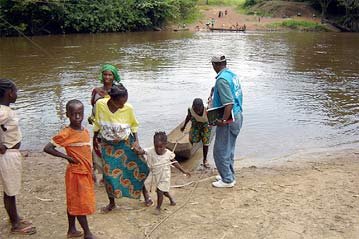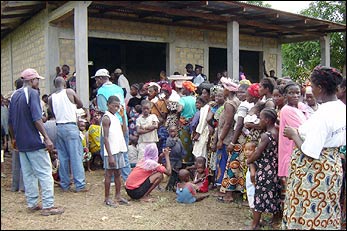UNHCR helps Liberia respond to continued Ivorian influx
UNHCR helps Liberia respond to continued Ivorian influx

BUTUO, Liberia, Nov 15 (UNHCR) - Over the past week, the small town of Butuo, located at the border with Côte d'Ivoire in the north-east of Liberia, has become a reception centre for thousands of Ivorian refugees fleeing the unrest in their country. UNHCR estimates that, as of Sunday, some 10,000 Ivorians had crossed the border into Liberia, with new arrivals still coming in every day.
In the last week, close to 5,500 refugees coming through three entry points have been registered in and around Butuo. This number does not include refugees crossing through seven other entry points.
For some, the flight into Liberia is reminiscent of bad memories not so long gone. It is the second time in two years that Zodo Gognascuo Jano had to leave his village of Daube in northern Côte d'Ivoire to look for assistance in neighbouring Liberia. In 2002, as fighting broke out between government troops and northern rebels, Jano fled to Butuo, leaving behind a burnt house and two children who had been captured by the rebel forces.
"At that time I lost everything," he recalls. "This time, as soon as I heard the sound of gunfire, I ran away with all my family."
Jano's deep fear of what could recur is symptomatic of a widespread panic among many of the refugees, who say they have left because they remember what happened two years ago, and are scared that fighting will once again break out between the rebels and the government.
UNHCR deployed staff and emergency supplies along the border as soon as the first refugees from Côte d'Ivoire arrived last week. The majority of the refugees are from villages located near the border area, with many of them coming from the town of Guiglo in western Côte d'Ivoire. They are crossing into Liberia at several entry points into Nimba county, on foot or by canoe. They belong largely to the Ghio ethnic group, and many of them have connections with the people of Butuo, who belong to the same ethnic group.
"I arrived safely in Liberia without any harassment and Liberian people welcomed me very well. We both know the tragic plight that a war can bring," one refugee woman tells UNHCR.
UNHCR teams including health, logistics, field and protection staff are going to the border every day to monitor the movement of refugees, and ensure that their needs are met. The staff distributed blankets, mats, soap, jerry cans, lanterns, plastic sheeting and high-protein biscuits to the newcomers. The refugee agency is working in close cooperation with the Liberian Bureau of Immigration and Naturalisation, as well as with the Liberian National Red Cross Society (LNRCS) and other UN agencies.
The biggest obstacle to delivering aid to the refugees is the poor state of the roads and lack of general infrastructure in north-eastern Liberia. The roads around Butuo are in very poor condition, some of them impassable by car. Motorbikes have been dispatched with supplies to the more remote areas. Last Friday, another stock of assistance items was lifted by UNMIL (United Nations Mission in Liberia) helicopter, while the WFP (World Food Programme) distributed high-protein biscuits.
Liberia itself is only just recovering from 14 years of civil strife, and UNHCR is deeply concerned at the impact that a large influx of refugees could have on the country's fragile infrastructure. Refugees are currently accommodated in public buildings and dispersed among the community.
"Although Liberia is still healing from years of civil war, the local communities opened the doors to their neighbours and are giving them hospitality," Fidelis Swai, Head of Sub-Office Saclepea, emphasized. "But logistics and communication facilities need to be reinforced to intervene in a timely manner in case of a large influx of refugees."

UNHCR is setting up two transit centres along the border, the main one in the town of Butuo, which will become operational within days if needed. The town now has three working hand pumps and a community health centre, but as a result of the years of civil strife, there is a shortage of drugs, and additional medicines are needed.
Should the situation deteriorate any further, the refugees will need to moved from the border area to a more secure location inside Liberia, notably the town of Saclepea, some 80 km to the west, where an existing refugee camp could accommodate up to 1,500 refugees. Bridges will need to be rebuilt and roads rehabilitated in order to transport the refugees.
UNHCR is concerned about the humanitarian dimensions of the crisis in Côte d'Ivoire, and its potential impact on the region. Emergency planning is underway with the Liberian authorities, other UN agencies and implementing partners to respond to the needs of the refugees.








